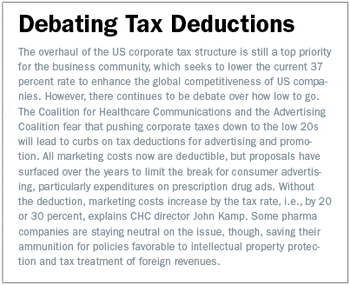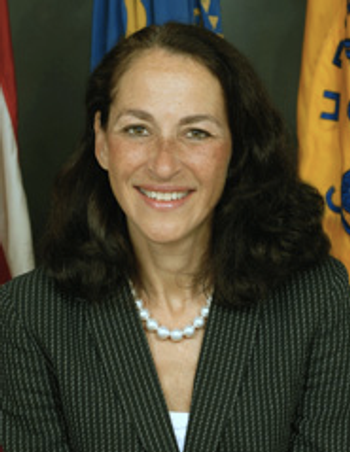
While biopharmaceutical companies are using websites and third-party postings to provide information on medical products - despite a host of regulatory issues - social media use is in its infancy related to the design and conduct of clinical trials.
Jill Wechsler is Pharm Exec's Washington Corespondent

While biopharmaceutical companies are using websites and third-party postings to provide information on medical products - despite a host of regulatory issues - social media use is in its infancy related to the design and conduct of clinical trials.

In an abrupt about-face, the Obama administration halted its ill-timed effort to launch an overhaul of the Medicare Part D program and announced it would not pursue changes in some key rules as proposed earlier this year.

Despite a slight boost in funding for the Food and Drug Administration and stronger tax incentives for investment in R&D, significant changes in Medicare drug reimbursement and coverage policies have biopharmaceutical companies up in arms.

Despite recent legislation to establish a more secure pharmaceutical supply chain to deliver high quality, approved medicines to American patients, efforts to block the import of substandard, fraudulent, and counterfeit drugs remains an uphill fight.

The growing clamor for broader access to information on health care practices, policies and costs is affecting research, marketing and compliance, writes Jill Wechsler.

Despite notable successes in preventing and mitigating short supplies of important medicines, the drug shortage crisis still disrupts medical treatment and gives drug manufacturers a bad name.

The Patient-Centered Outcomes Research Institute (PCORI) is launching new programs that are expected to encourage more analysis of the effectiveness of specific drugs and medical products

Marketers may see further advice from the Food and Drug Administration in the coming year that clarifies how they can use social media.

Moving fast to bolster its authority over compounding pharmacies that operate as manufacturers of prescription drugs, FDA is urging “outsourcers” to register, seeking state support, and moving to issue more rules and guidance.

After two years in budget limbo, Congress finally enacted federal spending legislation for fiscal year 2014 last week, just before the latest funding extension ran out. In this period of ever-tighter government outlays.

Pharma marketers have been clamoring for clear advice from the Food and Drug Administration on how to accommodate established rules governing drug promotion to today’s world of internet communications and social messaging.

As expected, the Food and Drug Administration (FDA) approved only 27 new molecular entities (NMEs) in 2013.

Pricing and personalized medicine are key themes shaping drug development and marketing in the U.S. in 2014, writes Jill Wechsler.

Pricing and personalized medicine are key themes shaping drug development and marketing

The bacterial meningitis outbreak at Princeton University in recent weeks has raised questions about why there is no vaccine in US to prevent this deadly disease, when such a therapy is approved in Europe and Australia.

Congress gave final approval this week to new legislation to strengthen Food and Drug Administration authority to oversee large pharmacy compounders of sterile injectibles and to require more comprehensive tracking of prescription drugs moving through the global supply chain.

FDA is proposing to revise its rules to permit generic drug manufacturers to initiate safety labeling changes, and not wait until the brand company takes that action.

Health plans that limit drug converge will encourage consumers to obtain medicines illegally, according to pharmacy experts.

High prices, murky financial relations, and a reluctance to disclose clinical data undermine public trust in industry and the research enterprise.

As insurers, payers, and drug plan operators eye increased generic drug use as key to cutting healthcare costs, pharma companies are ramping up efforts to delay marketing of copycat products.

Officials from the Food and Drug Administration and the National Institutes of Health were scheduled to explain developments in clinical trial registration and transparency at the Drug Information Association’s conference on Clinical Trial Disclosure in Bethesda, Md. this week.

Healthcare spending will rise modestly in the US over the next decade, as economic growth picks up, health reform provides expanded coverage, and the population continues to age, according to an annual analysis from the Centers for Medicare and Medicaid Services (CMS).

FDA commissioner Margaret Hamburg has formed a top-level working group to propose strategies for enhancing agency functions and processes, starting with the relationship between FDA Centers and its field force.

The blurring of advertising and editorial content, particularly through publishers’ websites and mobile applications, is in the spotlight at the Federal Trade Commission (FTC) as government regulators struggle to deal with the impact of social media on health-related promotion.

We’re already embroiled in the annual speculation game about whether FDA approvals this year will keep pace with last year’s near-record of 39 new molecular entities (NMEs) brought to market

FDA wants pharma leaders to do more to ensure drug quality at home and abroad. Our Washington correspondent Jill Wechsler reports.

Pharmaceutical companies can anticipate more costly, drawn-out patent litigation in the wake of the June 17 US Supreme Court decision, which creates great uncertainty about the grounds for negotiating settlements in patent cases.

The Supreme Court decision blocking patents on naturally-occurring genes has generated predictions of doom for biotech innovation, along with expectations of more healthy competition in discovering new treatments and diagnostics. Although some commentators regarded the decision, Association for Molecular Pathology v. Myriad Genetics, as a “major reversal” in longstanding patent policy, many leaders of the biopharmaceutical research community described the ruling as likely to spur innovation and the development of therapies and companion diagnostics necessary for advances in personalized medicine.

New approaches for conducting clinical trials and developing therapies that actually prevent and cure disease are key to the future of effective drug therapy, according to Janet Woodcock, director of the FDA’s Center for Drug Evaluation and Research (CDER).

Opioid abuse generates calls for efforts to curb distribution, develop abuse-resistant formulations.